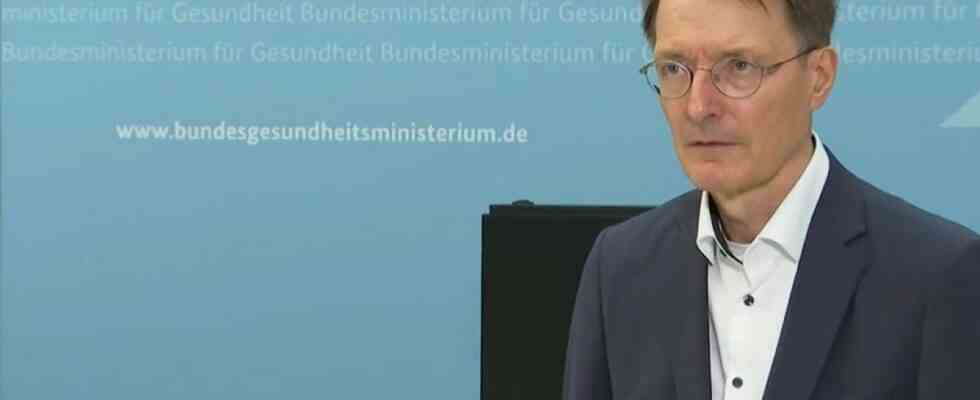BHealth Minister Karl Lauterbach (SPD) has expressed his satisfaction with the federal government’s draft for the new Infection Protection Act. “There are hard but clear rules,” he said in an interview with the WELT news channel. The German corona policy has always led to good results, “if there are clear rules that are not only easy to remember, but also really protect”.
The negotiations with Federal Minister of Justice Marco Buschmann (FDP) went in a good atmosphere. “It’s always a bit more complicated when a doctor is negotiating with a lawyer. That’s in the nature of things. But it was good talks and afterwards we got a good result – at least from my point of view.”
To protect against an autumn corona wave, the federal states should be allowed to impose mask requirements again from October. According to the draft, masks should continue to be compulsory on buses, trains and planes nationwide, as well as a new requirement for masks and tests in hospitals and care facilities.
The federal states should decide for themselves whether they also require masks in publicly accessible indoor areas. At cultural and sporting events and in restaurants, however, there should be exceptions for tested, newly vaccinated and recently recovered people. In addition, a mask requirement at outdoor events and upper limits for events are possible if a state parliament determines that there is a risk to the functionality of the health system or critical infrastructure in a country.
Lauterbach expects masks to be compulsory for Bundesliga games
Lauterbach assumes that the federal states would also make use of the stricter rules. At least you would have asked for it. “We have to be prepared for the fact that masks also have to be worn in the outdoor areas where the distances cannot be maintained – for example in the Bundesliga game, where you stand close together,” Lauterbach told the WELT broadcaster. “And of course it is the case that there are upper limits for many events.”
The Baden-Württemberg state government was disappointed with the federal government’s new draft for the Infection Protection Act. “We would have hoped for more from the draft, since the decisive means, namely a comprehensive toolbox for the federal states, is not provided,” said Minister of Health Manne Lucha (Greens) of the German Press Agency in Stuttgart. The draft falls short of the country’s expectations.
Stuttgart: Manfred Lucha (Bündnis 90/Die Grünen), Minister for Social Affairs and Integration of Baden-Württemberg
Source: dpa/Christoph Schmidt
Lucha criticized that it was not possible to introduce so-called 2G or 3G restrictions or contact restrictions in private and public spaces in extreme cases when the infection situation worsened. The draft law is divided into three stages, in which further measures can be taken depending on the pandemic situation, such as upper limits for events or a mask requirement indoors.
One has to check why, for example, in the first stage there should not be the possibility of introducing a mask requirement in doctor’s offices. Lucha also asked whether it made sense to allow exceptions to the mask requirement for vaccinated and recovered people if they could also be contagious.
“We hope that apart from basic measures next autumn and winter we will not need anything, but in the event of an emergency we must be able to act quickly and without hesitation,” said the minister. A comprehensive analysis and consultation of the draft law is now necessary.
Prime Minister Stephan Weil welcomes the draft
The Rhineland-Palatinate Minister of Health Clemens Hoch (SPD) initially wants to wait for the deliberations of the Conference of Health Ministers (GMK) next Tuesday. When asked, the minister said that he had always emphasized “that the federal states need legal leeway to be able to react adequately to a possible autumn wave”. The question of which instruments should be used in autumn depends on the actual development of the corona pandemic from October.
Prime Minister Stephan Weil (SPD) praised the draft of the Infection Protection Act. At first glance, measures are also planned that Lower Saxony has been demanding for a long time, including a general obligation to wear masks indoors. “I have always advocated that the federal states have to be able to react to the respective infection with a large toolbox – that’s why the details will be decisive,” said the SPD politician on Wednesday. The draft law will therefore be examined closely.
Lots of open questions
Virologist Hendrik Streeck, on the other hand, misses clear indicators in the new Infection Protection Act that the federal states can use to control their corona protection measures. “I’m wondering a bit about some of the details as to what that should look like,” said Streeck in an interview with the WELT news channel. He would have liked “clear indicators, clear guidelines”, similar to the “hotspot” regulation. The plans of the traffic light parties do not provide for any specific uniform thresholds above which countries can order extended corona measures.
“No clear guidelines on when countries should take these measures”
In the WELT interview, virologist Hendrik Streeck criticizes the new Infection Protection Act: There are no clear indicators for measures. There is a threat of an “outbidding competition” between the countries in terms of corona protection.
The German Hospital Society (DKG) also criticized the lack of limit values for assessing the overload in the healthcare system. “I welcome the fact that the Infection Protection Act will continue to offer the federal states opportunities to take active action against corona waves from autumn,” said DKG CEO Gerald Gaß to the “Redaktionsnetzwerk Deutschland” according to a preliminary report on Wednesday. “However, it still remains unclear which indicators must actually be used to determine the risk.”
According to the draft, the federal states should also be given the opportunity to prescribe tests in schools, daycare centers and facilities for accommodating asylum seekers. A mask requirement in school is only planned if otherwise no regulated face-to-face lessons would be possible – and then only from the fifth school year.
The measures are to apply from October 1, 2022 to April 7, 2023. Next, the cabinet will deal with the proposals, and then it will be up to the Bundestag.


